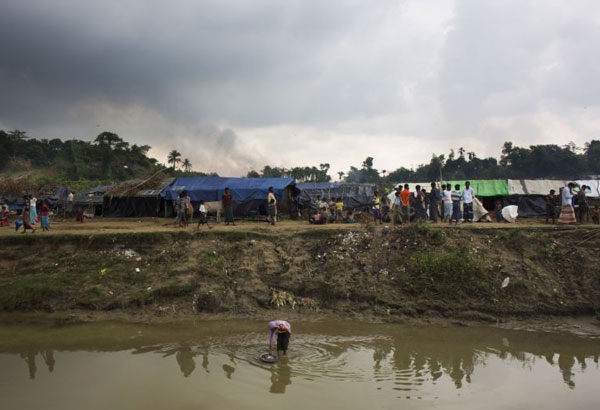Myanmar to resettle 6,000 stranded Rohingya refugees

FILE- In this Sept. 4, 2017 file photo, a Rohingya woman living in no man's land washes a pot from a stream near Cox's Bazar's Tumbru area, while smoke rises from fires across the border in Myanmar. A Bangladeshi official says Myanmar has agreed to resettle more than 6,000 Rohingya Muslims who have been stranded in a no man's land between the two countries, as plans for the repatriation of hundreds of thousands of others have been delayed over concerns for their safety if they return to Myanmar. (AP Photo/Bernat Armangue, File)
DHAKA — Myanmar agreed with Bangladesh on yesterday to resettle more than 6,000 Rohingya Muslims who have been stranded in a no man's land between the two countries, as plans for the repatriation of hundreds of thousands of others have been delayed over concerns for their safety if they return to Myanmar, officials said.
About 700,000 Rohingya Muslims have fled army-led violence in Buddhist-majority Myanmar since August and are living in refugee camps in Bangladesh. Some, however, became stranded at the Tombru border point after Myanmar reportedly began building bunkers and threatened the refugees to leave and enter Bangladesh, which denied their entry.
Ali Hossain, the top government administrator in Cox's Bazar district, said officials from the countries agreed that Myanmar would identify the stranded refugees and then resettle them.
He said Myanmar invited Bangladeshi officials to visit the Tombru border point in Naikkhongchhari and talk to the refugees.
"There was a dispute about who will verify them. We said that is the duty of Myanmar as they have not entered Bangladesh territory," he said. "Myanmar has agreed to list and resettle them."
Bangladesh Relief and Refugee Commissioner Abul Kalam said they went to the site to "encourage the refugees" to go back voluntarily.
"The refugees told us they want to go back and get settled in their homes. We pressed the Myanmar authorities to create a congenial and safe atmosphere to resettle them," Kalam said by phone. "The Myanmar side has agreed to take that responsibility."
Kalam said their return must be voluntary under the terms of a November agreement between the two countries.
Last Friday, Bangladesh Home Minister Asaduzzaman Khan gave a list of 8,032 Rohingya refugees to his Myanmar counterpart to begin repatriations. The list contained the members of 1,673 Rohingya families. yesterday's decision was unrelated to that list.
The two countries originally agreed to begin repatriations last month, but they were delayed by concerns among aid workers and Rohingya that they would be forced to return and face unsafe conditions in Myanmar.
The August violence erupted after an underground insurgent group, the Arakan Rohingya Salvation Army, attacked security outposts in Rakhine. In retaliation, the military and Buddhist mobs launched "clearance operations" against Rohingya.
Myanmar's security forces have been accused of atrocities against the Rohingya, including killing, rape and arson. The United Nations and the US have described the army crackdown as "ethnic cleansing."
The Rohingya have long been treated as outsiders in Myanmar, even though their families have lived in the country for generations. Nearly all have been denied citizenship since 1982, effectively rendering them stateless. They are denied freedom of movement and other basic rights.
UN refugee chief Filippo Grandi told the Security Council last week that conditions aren't right for Rohingya to voluntarily return because Myanmar hasn't addressed their denial of rights. Grandi also said Rohingya are still fleeing Myanmar and thousands more are expected to leave.
Bangladesh says more than a million Rohingya are currently living in Bangladesh.
- Latest
- Trending

































